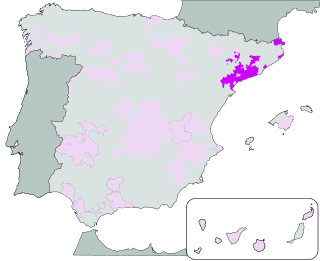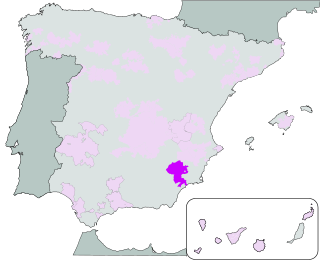Related Research Articles

Somontano is a Spanish Denominación de Origen Protegida (DOP) for wines, created in 1984, and located in the county of the same name, in the province of Huesca,. It borders the regions of Sobrarbe and Ribagorza in the North, Hoya de Huesca in the West, the Monegros in the South, and the region of Litera in the East. Wine production is centred on the town of Barbastro. The name Somontano, as its Latin roots suggest, means “beneath the mountain” – this perfectly defines this geographic area which spreads out from the foothills of the Pyrenees down to the Ebro valley. The DOP includes 43 municipalities, most of them in the Somontano area, and a few bordering on Ribagorza and the Monegros. There are over 4000 hectares of vines and about 500 individual grape-growers.

Calatayud is a Spanish Denominación de Origen Protegida (DOP) for wines located in the southwestern corner of the province of Zaragoza about 90 km from Zaragoza and covers over 5,600 ha, extending over 46 different municipalities, including Calatayud itself. It borders with the Cariñena (DO) in the east and with the province of Soria in the west. It is in the Ebro River valley and is crisscrossed by many of the Ebro's tributaries including the Jalón, Jiloca, Manubles, Mesa (river), Piedra and Ribota. The vineyards are found on the south facing slopes of the Sierra de la Virgen range at heights of between 550 m and 800 m above sea level.

Ribera del Júcar is a Spanish Denominación de Origen Protegida (DOP) for wines located in the province of Cuenca along the banks of the River Júcar and covers 7 municipalities.

Catalunya is a Spanish Denominación de Origen Protegida (DOP) for Catalan wine which was formally recognised in 2001. It was created with the specific purpose of providing commercial support to over 200 wineries (bodegas) that produced quality wine but which were not included in other specific DOP's in Catalonia. It does not have a specific geographical location but is formed by over 40 km2 of individual vineyards which are dispersed all over Catalonia, and allows mixing of grapes from other DOPs.

Conca de Barberà is a Spanish Denominación de Origen Protegida (DOP) for wines located in central Catalonia in the northern portion of the Tarragona Province. Situated within the river valleys of the Francolí and Anguera, it has historically been known for its white wines, but has been gaining more attention for its reds, especially those from the native Trepat grape. Today, the Conca de Barberà DOP mainly produces red wines, along with whites, and minor amounts of rosés and sparkling wines.

Costers del Segre is a Spanish Denominación de Origen Protegida (DOP) for wines located in the province of Lleida and is divided into several separate sub-zones. The four original subzones created in 1988 are Artesa, to the northeast of Lleida, Valls de Riucorb to the east, Garrigues and Raïmat. In 1998 two other subzones were added: Pallars Jussà, next to the town of Tremp, 90 km north of Lleida and Segrià to the west and surrounded by the Raimat subzone.

Pla de Bages is a Spanish Denominación de Origen Protegida (DOP) for Catalan wines, located in the province of Barcelona, and is one of the smallest DOPs in Spain, covering less than 500 hectares. It is also one of the newest having acquired its official status in 1997.

Tarragona is a Spanish Denominación de Origen Protegida (DOP) for Catalan wines, located in the province of Tarragona and covers two distinct areas: the Camp de Tarragona and the Ribera d'Ebre comarca (district).

Terra Alta is a Spanish Denominación de Origen Protegida (DOP) for Catalan wines, located in the west of the province of Tarragona and covers 12 inland municipalities. As the name indicates the area is in the mountains. It features in a number of Picasso’s paintings.

Valencia is a Spanish Denominación de Origen Protegida (DOP) for wines located in the Province of Valencia within the Valencian Community and is divided into two separate zones and four sub-zones, each of which produces a different type of wine.

Bullas is a Spanish Denominación de Origen Protegida (DOP) for wines located in the region of Murcia (Spain) and covers the territories of eight different municipalities, including Caravaca de la Cruz, Moratalla and Bullas itself. The region is renowned for its young reds and rosés made from the Monastrell grape variety.

Yecla is a Spanish Denominación de Origen Protegida (DOP) for wines located around the town of Yecla in the northernmost corner of the region of Murcia (Spain) and is surrounded by other DOPs: Jumilla to the south and west, Almansa to the north and Alicante to the east. The area is notable for its extensive use of the red Monastrell grape variety, and it is traditionally known as the home of Monastrell in Spain. Monastrell is the fourth most planted red grape variety in Spain. The international market makes up 92% of the DOP's wine sales, making it the Spanish wine DOP with the highest proportion of international exports.

Binissalem is a Spanish Denominación de Origen Protegida (DOP) for wines located around the town of Binissalem in the centre of the island of Majorca,.

Pla i Llevant is a Spanish Denominación de Origen Protegida (DOP) for wines located on the island of Majorca, Balearic Islands, Spain. The name in the Catalan or Majorcan language means "plain and east coast."

Catalan wines are those that are produced in the wine regions of Catalonia. Occasionally, the appellation is applied to some French wine made in the Catalan region of Roussillon and neighboring areas, also known as Northern Catalonia or the Pays catalans. The city of Barcelona is the capital of Catalonia and despite not being in a wine region, it is the focal point of the Catalan wine industry: a primary consumer market, its port provides export functions and a source of financial resources and investment. The Penedès is the largest wine-making region in Catalonia.

Txakoli de Álava (Basque) or Chacolí de Álava (Spanish) is a Spanish Denominación de Origen Protegida (DOP) for wines, located around the towns of Amurrio, Llodio, Artziniega, Okondo and Aiara in the province of Álava, Basque Country, Spain.

Penedès is a Spanish Denominación de Origen Protegida (DOP) for wines in Catalonia, (Spain). Penedès DOP includes all of the Penedès region and municipalities of four other counties: Anoia, Alt Camp, Baix Llobregat and Tarragonès. The area is framed by the coastal hills of the Garraf Massif and the higher inland mountains which skirt the Central Depression.

Montsant is a Spanish Denominación de Origen Protegida (DOP) for wine located in the province of Tarragona and covers 12 municipalities. It was previously known as the Falset subzone of Tarragona (DO), and was created as a separate DO in the early 2000s. Regional approval came in 2001, and from 2002 wines were sold as Montsant rather than Tarragona. Montsant takes its name from the Montsant Mountains in the area.

Granada is a Spanish Denominación de Origen Protegida (DOP) for wines in the province of Granada, Andalusia, Spain, extending over 168 different municipalities. There is also sub-zone known as "Contraviesa-Alpujarras", covering another 13 municipalities in the Alpujarras mountains. Granada achieved Vino de Calidad status in 2009, and Denominación de Origen status in 2018.
Lebrija is a Spanish Denominación de Origen Protegida (DOP), traditionally called a Vino de calidad con Indicación Geográfica. This is one step below the mainstream Denominación de Origen quality wines and one step above the less stringent Vino de la Tierra wines on the quality ladder. It is located in the province of Seville, and as of 2019 includes one winery, Bodegas González Palacios.
References
- 1 2 J. Robinson, J. Harding and J. Vouillamoz Wine Grapes - A complete guide to 1,368 vine varieties, including their origins and flavours ISBN 978-1-846-14446-2